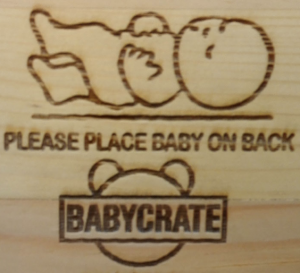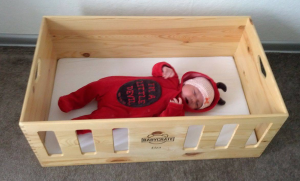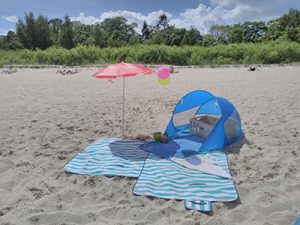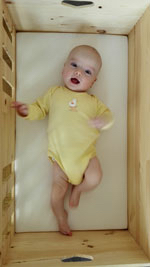Baby Sleep & SIDS
For the first six months, newborn babies sleep 14-18 hours per day. SIDS – the terrifying acronym for new parents is the sudden, unexpected and unexplainable death of a child under the age of 1. The vast majority of SIDS deaths happen to babies who are under the age of six months. This is why we make the BabyCrate, to ensure that your baby can sleep in the very best possible environment that addresses the factors contributing to SIDS during the most crucial first months.
Firm, flat Surface
Your baby should sleep on a firm, flat surface at all times. If your baby sleeps in a car seat or an armchair it could impede optimal breathing. If the pad is too soft it could cause future issues with posture and even cause suffocation once your baby can roll over.
The BabyCrate comes with a very high-quality 100% natural Latex mattress pad to ensure optimal firmness in a safe, cozy space without toxic off gassing.

Back sleep position
No ifs and buts: your baby should sleep on their back at all times. The increasingly common back sleep position is considered one of the main reasons for the reduction in SIDS in recent years.
When your baby is awake, however, tummy time is crucial to train your baby’s neck and avoid continuous pressure on the same spot of your baby’s head, potentially leading to flat head syndrome.

The BabyCrate has an attractive engraving reminding you or other carers to put your baby to sleep in the back position.
No clutter
Avoid bumpers, soft toys, lambskins, and pillows in your baby’s sleep space. Indeed, a sleepsuit is preferable to a sleeping bag.

All-Natural and organic
Chemical compounds common in crib mattresses, especially flame retardants such as phosphorus, arsenic and antimony are thought to be one of the main causes of SIDS today. The latex mattress pad in the BabyCrate is 100% natural, made using the traditional Dunlop process without any chemicals or pesticides and covered in a pure organic cotton mattress cover and sheets. Latex is also naturally fungus and dust-mite resistant, so you can be sure to be offering your baby the very best all-natural bedding possible.
Certified Safe
Our BabyCrate is certified according to the requirements of the United States Consumer Product Safety Commission and the materials used are certified chemical safe according to US and European Norms.
Allergies
Some proteins in organic latex are similar to food proteins such as: bananas, avocados, chestnuts, kiwi, and tomatoes. These are known to potentially cause allergies when touched or ingested. Although Latex allergies are common when touching items such as Latex gloves, balloons or products such as condoms that come in to direct contact with the body, our thick organic cotton mattress covers and sheets ensure that no such contact is made. Our 100 percent organic latex manufacturing process also helps prevent allergies. We use gallons of clean drinkable quality water in the final wash to remove residual free proteins from our pads and to minimize the potential for allergies.
Even though we have made the BabyCrate as practical as possible so that your newborn can have a safe sleep space wherever you go, you remain the most important factor. Avoid the temptation of sleeping in a bed with your baby after breastfeeding or allowing your baby to sleep on the sofa during the day and always keep your BabyCrate in a well-ventilated, smoke-free space.

We know its a lot to consider, so why have it more difficult than it needs to be?
With a BabyCrate, not only can your baby sleep safe, but you will not have to worry about the sleep space of your infant anymore.


